-
-
2025 | 2026 - Education and Examination Guides - All Programmes
-
-
This glossary contains an overview of some of the terminologies, definitions and abbreviations used at Wittenborg University of Applied Sciences.
Wittenborg Online News!
Why Talent Development Is Essential in Today’s Organisations: Insights from Imane Jelloul
Why Talent Development Is Essential in Today’s Organisations: Insights from Imane Jelloul
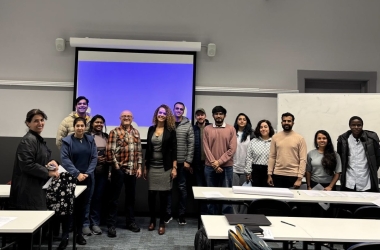
MBA Students Explore Leadership and Talent Development in Apeldoorn
Wittenborg recently hosted Imane Jelloul, Head of HR & Communication at ArcelorMittal Europe Flat Products, for a guest lecture on talent development and leadership in global organisations.
Drawing on over 20 years of experience in the steel industry and international HR, Imane shared her journey from leading operations on industrial sites to heading strategic HR initiatives across global companies. “I am an HR and industrial leader in the steel industry, organisational transformation, and leadership development across global and multicultural environments,” she explained. She also highlighted her contributions to major projects, including the launch of Morocco’s first modern steelmaking plant.
Throughout the session, Imane emphasised that leadership starts with self-leadership. “Before leading teams, projects, or organisations, we must learn to lead ourselves with clarity, purpose, and integrity,” she said. She encouraged students to see leadership as a mindset rather than a title. “In a global and changing world, your greatest strengths will be your humanity, your ability to connect with others, and your commitment to continuous learning.”
Imane explored why talent development is crucial for organisations today. “No transformation—digital, organisational, or industrial—can succeed without people who are prepared and empowered,” she said.
Drawing on her experience in multinational environments, she shared insights on building leadership pipelines, strengthening succession planning, and fostering resilient and inclusive cultures. She illustrated these points with real-world industrial examples, including organisational design, cultural transformation initiatives, and coaching programmes.
The lecture was very interactive. Students asked questions about career transitions, leadership readiness, and how smaller organisations can develop talent without significant financial investment. “Even in smaller companies, you can implement effective talent development approaches based on coaching, peer learning, and structured feedback,” Imane advised. Faculty feedback highlighted how much they had learned about talent development practices in the steel industry, reinforcing the value of connecting academic learning with practical experience.
In closing, Imane offered advice for aspiring leaders: “Cultivate self-leadership first. Build strong interpersonal and communication skills. Seek diverse experiences early. Stay open to continuous learning. Look for mentors and role models.” She reminded students that leadership is not a title but a way of thinking and acting. “It is always a privilege to connect academic perspectives with real-life experience, and I am grateful for the opportunity to contribute to the development of the next generation of leaders.”
WUP 07/01/2025
by Erene Roux
©WUAS Press
Tags
#SDG8: Decent Work and Economic Growth
#Internationalisation
#internationalstudent
#Diversity
#highered
#apeldoorn
423 words
Whispers of Magic: Wittenborg Student Releases Short Film Online
Whispers of Magic: Wittenborg Student Releases Short Film Online

https://www.wittenborg.eu/whispers-magic-wittenborg-student-releases-short-film-online.htm
Sara Seyed Azizi’s Animation Tells Story of Young Woman Dealing with Anxiety
The beautiful short film ‘Whispers of Magic’, created by Wittenborg MBM student Sara Seyed Azizi, is now available on YouTube for everyone to enjoy. Produced in 2024, the film centres on a young woman struggling with anxiety and stress, who escapes into an imaginary world where she becomes a child version of herself.
The story is inspired by Sara’s own feelings of frustration when her visa to the UK was unexpectedly denied, forcing her to abandon her plans to study for a bachelor's degree in Games Art at the University of the Arts, London.
To create ‘Whispers of Magic’, Sara used Unreal Engine and other 3D computer graphics software, building on her previous experience with those tools. The film was screened in various festivals across countries including the Netherlands, Italy, Sweden, Portugal, Spain, India and Brazil. It won awards at the Amsterdam New Cinema Film Festival, Stockholm City Film Festival, Portugal Indie Film Festival, Kollywood International Film Festival and Rohip International Film Festival, as well as an Honourable Mention at the UK Film Awards.
For Sara, art is as much about self-expression as it is about connecting with others. “I’m happy that the people who have seen ‘Whispers of Magic’ enjoyed it and connected with it. The main reason we create is to connect with the world around us, and that essential element can’t be ignored. I don’t think I’ll ever be the kind of artist who cares about sales or attention; for me, what matters is my own feeling and taste in creating the piece,” she says.
Whispers of Magic: Wittenborg Student Releases Short Film Online
The student notes that she would like to develop other artistic projects for different media, including games. “I’ve always dreamed of creating a full video game based on the first book of The Chronicles of Narnia, but to make that happen, I’d need to build a complete team, so that’s something for the future.”
Sara is also passionate about literature and has been working on two books for years, one in the crime genre and the other in fantasy. “I feel that now might be the right time to publish the crime novel; it tells the story of a lawyer who lost his family as a child during a revolutionary uprising in his country. Twenty years later, he receives an anonymous letter from someone who claims to have information about the person who murdered his family.”
She encourages emerging artists to be authentic and bring their visions to life. “You don’t need to be afraid of failure, of not having enough viewers or not being liked by everyone. Most great artists weren’t even recognised until after their death, and the true value of art doesn’t lie in how many people see it. My advice to all emerging artists is this: bring every pattern of your imagination to life, even the strange ones.”
WUP 05/01/2025
by Ulisses Sawczuk
©WUAS Press
Tags
#SDG3: Good Health and Well-being
#Internationalisation
#internationalstudent
#studyinholland
517 words
In the Spotlight: Wittenborg Graduate Rosita Sayyar
In the Spotlight: Wittenborg Graduate Rosita Sayyar
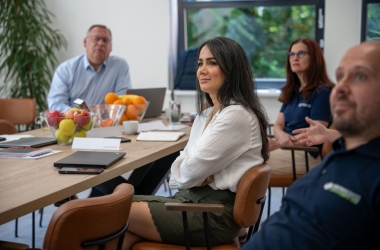
https://www.wittenborg.eu/spotlight-wittenborg-graduate-rosita-sayyar.htm
How Rosita Sayyar is Shaping Brand Success at CECO Environmental Corporation
Rosita Sayyar, originally from Iran, has successfully navigated the path from a bachelor’s degree in Computer Engineering to becoming a Marketing Specialist in the Netherlands. Now living in Hilversum, she graduated from Wittenborg in 2025 with a degree in Digital Marketing and Communication and has since built an inspiring career.
Why Wittenborg and the Netherlands?
Rosita chose Wittenborg for its flexible intake system—six entries per year—which made planning her move and registration easier. She was also drawn to the culture and “vibe” of the Netherlands, which resonated with her.
Overcoming Challenges
Moving to a new country comes with its challenges. For Rosita, the biggest hurdle was finding housing. “For renting a house, you need a work contract, and as a student, it’s hard to find a good place you can call home,” she recalls. After four months of searching, she finally found a comfortable apartment in Apeldoorn, near Wittenborg. Her advice to fellow students: “Don’t give up and try your best; all your efforts will pay off when the time comes!”
Academic and Professional Growth
During her time at Wittenborg, Rosita honed key skills in presentation, public speaking, and clear communication. One lesson from a lecturer left a lasting impression: “You should learn to ask for help when you need it! People cannot read your mind. Until you ask, they cannot understand that you need support.”
Rosita also gained practical experience quickly. Just three months after arriving in the Netherlands, she secured a six-month internship, which led to a part-time role. By the time she completed her thesis, she was hired full-time as a Marketing Specialist at CECO Environmental Corporation, where she now manages three different brands, overseeing event management, social media, and websites. She credits Wittenborg with equipping her with skills in business management, market analysis, and strategic thinking from multiple perspectives.
Looking Ahead
Rosita’s future plans include exploring how AI affects future digital marketing and changes the customer. She says Wittenborg helped broaden her horizons and encouraged her to think outside the box.
Her advice to current students is simple but powerful: “Be concise about what you want, stick to your goal, and do everything necessary to achieve it.”
WUP 02/01/2025
by Erene Roux
©WUAS Press
Tags
#Alumni
#internationalstudent
#SDG9: Industry, Innovation and Infrastructure
#Internationalisation
#Diversity
399 words
Students Explore Gender Equality in Business and Society During December Project Week
Students Explore Gender Equality in Business and Society During December Project Week
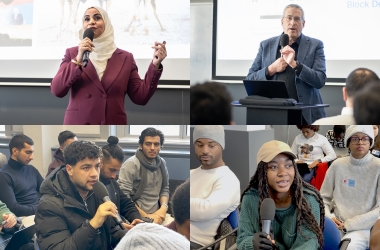
Students Showcase Innovative Solutions Through Posters
From 15 to 17 December 2025, bachelor’s students came together for Wittenborg’s December Block Project Week, placing gender equality at the centre of business and societal debate. Built around the United Nations’ Sustainable Development Goal (SDG) #5: Gender Equality, the three-day programme challenged students to critically examine real-world inequalities and develop research-driven solutions that promote inclusion, equity and sustainable impact.
Throughout the Project Week, students explored gender equality across a wide range of organisational and societal contexts, including leadership, pay equity, entrepreneurship, marketing and technology. Working with data and case studies, students applied analytical, creative and strategic thinking to propose actionable recommendations aligned with the targets of SDG 5.
Keynotes and Expert Perspectives
The Project Week opened on 15 December at Wittenborg’s Spoorstraat campus with an introductory session, followed by a welcome address from Wittenborg President Peter Birdsall. The programme featured a keynote speech by Noha Shafik, who engaged students in discussions around purpose, values and wellbeing.
Reflecting on her interaction with the students, Shafik praised their engagement and curiosity. “Your energy and vibe were amazing. The deep, insightful questions made me genuinely happy and reminded me why I love these conversations,” she said.
She explained that the discussions strongly aligned with her mission to raise awareness about discovering one’s values and purpose, staying connected to one’s authentic self and understanding how this supports wellbeing and life choices. Shafik emphasised her commitment to continuing this message across universities, companies, schools and communities.
The keynote was followed by a panel introduction featuring Lucinda Douglas, Awura Abena Simpe, Robert Muster and Tim Birdsall, who later contributed video reflections on gender equality. They shared insights on leadership, organisational culture and policy in advancing gender equality within the workplace and beyond.
Later, Simpe, a soft skills expert specialising in Gen Z and Gen Alpha, highlighted the importance of an intersectional approach to gender equality.
She noted that women are not a uniform group and that differences in culture, age and neurodiversity must be considered when designing inclusive strategies. Simpe also stressed the growing importance of emotional intelligence in leadership, arguing that while artificial intelligence continues to develop, the ability to connect with and manage people will remain a key leadership advantage.
She encouraged students to focus on creating consistent and strategic impact, emphasising that progress is most effective when pursued collaboratively.
Douglas addressed the role of interpersonal skills in driving meaningful change. She highlighted the importance of challenging existing attitudes around gender equality and encouraged men to actively support and advocate for women.
Douglas advised students to take ownership of their personal and professional journeys, acknowledging that while progress can be challenging, meaningful change begins by taking the first step and “starting to write your own book”.
Birdsall emphasised the value of seeking diverse perspectives, encouraging students to look beyond their own viewpoints. He highlighted the importance of humility and openness, reminding participants that engaging with perspectives different from their own is essential to building inclusive and balanced conversations.
Research-Driven Group Work and Poster Presentations
On 16 December, students worked in assigned groups to develop research-driven posters aligned with specific targets of SDG 5. The final day was dedicated to finalising and presenting these posters during the Project Challenge, where they were evaluated by a jury.
The poster presentations covered a broad range of topics related to gender equality in business and society. These included how organisations address harmful cultural practices, gender diversity in Fortune 500 companies with strategies to enhance representation and corporate initiatives to prevent workplace harassment, with examples from companies such as Amazon and Unilever.
Other projects examined microfinance for women and how access to credit empowers women, as well as solutions proposed by global leaders through corporate compliance and governance.
Additional posters focused on corporate strategies supporting work–life balance and caregiving responsibilities, universal access to reproductive health and the creation of safe spaces for women, equal rights to economic resources and the role of law and policy in advancing gender equality.
Together, the projects highlighted the complexity of gender equality and demonstrated the need for multifaceted and context-specific approaches to achieving gender equality.
WUP 19/12/2025
by Erene Roux
©WUAS Press
Tags
#SDG5: Gender Equality
#projectweeks
#Internationalisation
#internationalstudent
#Diversity
#Ethics
#apeldoorn
#research
721 words
Festive Fun and Holiday Cheer: Wittenborg Wraps Up 2025
Festive Fun and Holiday Cheer: Wittenborg Wraps Up 2025

https://www.wittenborg.eu/festive-fun-and-holiday-cheer-wittenborg-wraps-2025.htm
Wittenborg Celebrates 2025 with Festive Gatherings in Apeldoorn and Amsterdam
Wittenborg University of Applied Sciences wrapped up 2025 with two festive year-end events in Apeldoorn and Amsterdam, bringing together students, staff and alumni for music, drinks, dancing and community celebrations.
On 17 December, Wittenborg hosted its annual Christmas Drink Event at the Old Irish Pub in Apeldoorn. The gathering followed the conclusion of the SDG Gender Equality themed Project Week in the December block and began shortly after students completed their poster competition assessments. As one of Wittenborg’s well-established events, the evening focused on community spirit, holiday cheer and informal networking.
Sophia Faraji, External Relations & Events Manager, said the event “captured a wonderful sense of togetherness and celebration. It was great to see everyone relaxed and enjoying themselves, as it truly reflected the spirit of the season.”
The evening also served as the platform to announce the new Student Representatives. The election, held earlier in December, appointed Jasmine Shaw, Shelly Anand and Arshia Baharloueiyan as the top-voted representatives.
Shaw said, “I had a fantastic time. The Christmas lights sparkled and the energy of students and staff was high. It’s always such a good vibe when we can all be together in a positive and casual environment after working hard at project week.”
Baharloueiyan, who also dressed up as Santa, shared, “Playing Santa was a blast. Putting on the costume and getting into character instantly changed the mood, and the reactions from everyone made it even better. It was impossible not to smile the whole time.”
Asked about the party overall, he added, “The party was amazing! Great vibes, great music, and lots of happy faces. Everything came together perfectly and it was a proper university celebration.”
On the highlight of the evening, he said, “Definitely the interactions with students — the laughs, photos, and festive energy. Seeing everyone enjoy themselves and fully embrace the Christmas spirit was the highlight for me.”
In Amsterdam, Wittenborg closed the year with a DJ Night Party on 12 December 2025 at ClinkNOORD, hosted by Clink Hostels. The event brought together students, staff, and alumni for an evening of music, dancing, and casual socialising.
Dadi Chen, Deputy Head of School of Business, said it was great having alumni join the event, noting the enthusiasm of students who were keen to ask questions. “What an amazing night! We are still buzzing from the energy and happiness shared at the recent party, bringing together our brilliant alumni, staff, and students.”
Wittenborg alumna and Financial Administrator Amal Obi Orm added, “The DJ Party in Amsterdam was a wonderful way to close the year. I really enjoyed meeting staff, connecting with new and old students, and sharing fun moments together. Dancing, enjoying drinks, and playing games with both students and staff made the event lively and memorable.”
EBA Amsterdam student Ahd El Kafi, who designed the event poster and flyers for the event, said, “Seeing something I created become part of such an important end-of-year moment was a proud and rewarding experience. The December Block event is one of those occasions where students, staff, alumni, and leadership all come together, reinforcing the strong sense of connection at Wittenborg.”
With house, EDM, and mixed genres setting the tone, and a mini game zone keeping energy high, she added, “Moments like these show how creativity can bring people together and make the end of the year feel truly special.”
WUP 18/12/2025
by Erene Roux
©WUAS Press
Tags
#SDG3: Good Health and Well-being
#Internationalisation
#internationalstudent
#Diversity
#apeldoorn
#studyinholland
596 words
Wittenborg Celebrates New Outdoor Sculptures in Apeldoorn's Catharina Amalia Park
Wittenborg Celebrates New Outdoor Sculptures in Apeldoorn's Catharina Amalia Park

Wittenborg CEO Maggie Feng Part of Jury for New Catharina Amalia Park Sculptures
Wittenborg’s Maggie Feng, CEO, was delighted to be part of the jury that selected a new series of contemporary sculptures for the Catharina Amalia Park in Apeldoorn.
The installation, designed by internationally renowned Dutch designer Ineke Hans, was unveiled to the public on 15 December. Commissioned by the Municipality of Apeldoorn in collaboration with the ACEC Foundation, the project brings a modern interpretation of the historic garden vases of Paleis Het Loo into one of Apeldoorn’s most beloved green spaces.
The sculptures transform traditional vase forms into functional benches filled with origami-like flowers and are positioned thoughtfully along park paths and water features. Crafted from warm, natural wood, they harmonise with the park’s greenery while adding a playful contemporary accent.
Feng explained the jury’s process: “The selection began almost three years ago with a wide net of artists considered. This particular artwork scored very high. The artist embedded the story of Paleis Het Loo and its culture beautifully into her work. We are proud to help make art accessible to everyone in Apeldoorn while enhancing public spaces.”
The ACEC Foundation, which advises the Municipality on public art, ensured the sculptures align with both the park’s spatial layout and Apeldoorn’s historical and cultural heritage.
The new installation not only serves as functional public furniture but also connects the city’s royal history with contemporary design, inviting visitors to enjoy an artistic experience in daily life.
For more information on the installation and the designer, visit the ACEC website.
WUP 17/12/2025
by Erene Roux
©WUAS Press
277 words
How Risk Management and Financial Indicators Drive Corporate Sustainability
How Risk Management and Financial Indicators Drive Corporate Sustainability
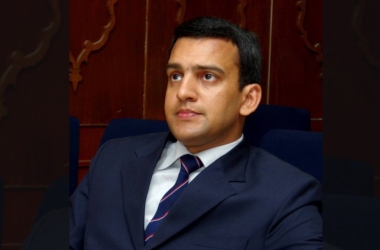
Guest Lecture by Dr Muhammad Naveed Explores Financial Risk, Sustainability and Investor Confidence
Wittenborg recently welcomed Dr Muhammad Naveed, a leading expert in finance, for an insightful guest lecture titled 'How Financial Indicators and Risk Management Practices Shape Corporate Financial Sustainability and Investors’ Confidence'.
The lecture took place on 17 September, at Wittenborg’s Brinklaan campus in Apeldoorn and online, giving students from the International Business Administration (IBA) programme the opportunity to engage directly with an internationally recognised finance scholar and policymaker.
Naveed is a Professor of Finance at Bahria University and serves as Advisor on Financial Economy to the Government of Pakistan, providing guidance on financial reforms, economic stability, investment facilitation and corporate sustainability.
“I am a Senior Professor with a background in Corporate Finance, Corporate Governance, Capital Markets and Financial Economy,” he said. “My work focuses on research, teaching and contributing to academic excellence, policy development and corporate-academia advocacy.”
Previously, Naveed served as Dean of Management Sciences and Principal of the Business School at Bahria University. His academic and policy contributions reflect a commitment to strengthening financial systems and promoting sustainable economic growth.
During his lecture, Naveed addressed four interconnected themes: financial risk management, corporate financial sustainability, investors’ confidence and financial analysis.
“These topics are highly relevant as they form the foundation of resilient financial systems,” he explained. “Risk management safeguards against uncertainties, corporate sustainability ensures long-term stability, investors’ confidence attracts and retains capital, and financial analysis underpins informed decisions. Collectively, they reinforce capital market strength and economic growth.”
“The main message I wanted to give students,” Naveed said, “is that understanding risk management, sustainability, investor confidence and financial analysis is essential. Mastering these areas equips you to build resilient financial systems, make informed decisions and contribute to strong capital markets and economic growth.”
The session was highly interactive, with students engaging in thoughtful discussions and case analysis. “The interaction with the audience was engaging and interactive,” he reflected. “I encouraged questions, welcomed diverse perspectives and facilitated discussions to ensure concepts were clearly understood and practically connected to real-world examples, such as the case study of Tesla.”
Several students posed insightful questions, sparking conversations about the relationship between corporate risk-taking and investor perception, as well as how sustainability practices influence long-term financial performance.
Naveed concluded by offering practical advice for students aspiring to work in finance-related fields. “Learn about the new age of finance with increased focus on fintech, financial analytics and sustainable finance,” he advised. “Unleash the acumen of the CFO towards innovation.”
WUP 16/12/2025
by Erene Roux
©WUAS Press
Tags
#SDG11: Sustainable Cities and Communities
#Internationalisation
#Diversity
#apeldoorn
#highered
442 words
Wittenborg Associate Professor Discusses Sustainability and Tourism at University of Bologna
Wittenborg Associate Professor Discusses Sustainability and Tourism at University of Bologna
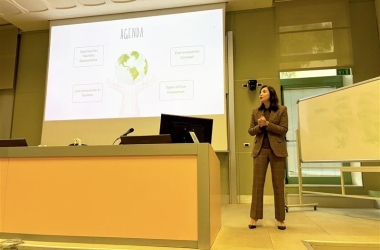
Vanessa Menezes Presents Results of Wittenborg’s Erasmus+ Busy Bees Project
Wittenborg associate professor Vanessa Menezes participated in an Erasmus+ Staff Mobility activity at the University of Bologna’s Rimini Campus in Italy from 16 to 20 October. The event brought together approximately 100 participants, including students from the university’s Bachelor of Economics in Tourism & Cities and Master’s in Tourism Economics & Management programmes, along with faculty members.
Menezes delivered the main welcoming lecture to students, addressing the theme of Eco-innovation in Touristic Destinations and sharing insights into how innovation can foster more sustainable and competitive destinations. She also led a workshop on Sustainability in Hospitality, discussing inspiring real-world cases and presenting the results of Wittenborg’s Research Centre’s Erasmus+ project Busy Bees. The topics included Life Cycle Analysis, Green Marketing and Greenwashing, as well as how students can collaborate with SMEs by proposing simple yet innovative ideas.
The associate professor thanked the University of Bologna for the hospitality, highlighting that it was truly a privilege to connect and exchange ideas with such an inspiring academic community. “The University of Bologna is one of the oldest and most prestigious universities in the world, and this was an invaluable opportunity not only to observe their operations but also to exchange knowledge and gain new perspectives.”
She added that, as a lecturer in tourism and hospitality, it was rewarding to visit Rimini, a popular destination in Italy and Europe, and see how the city lives and breathes tourism in its everyday life. “This exchange was part of a mobility programme sponsored by Erasmus+, which continues to foster collaboration and knowledge exchange across Europe. The programme offers great opportunities for both our staff and students to gain a fresh perspective on knowledge and education. I would encourage more people to take advantage of this opportunity,” Menezes concluded.
WUP 15/12/2025
by Ulisses Sawczuk
©WUAS Press
Tags
#Erasmus+
#research
#ResearchCentre
#Internationalisation
#Diversity
#SDG17: Partnerships to achieve the Goal
333 words
Research Your Way to Career Success: Practical Tips by Julieta Timane
Timane Shares How Students Can Use Research Methods to Navigate Career Transitions
https://www.wittenborg.eu/research-your-way-career-success-practical-tips-julieta-timane.htm
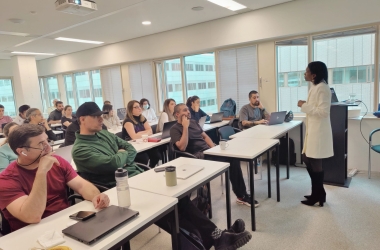
Timane Shares How Students Can Use Research Methods to Navigate Career Transitions
On 3 October, Wittenborg MBA students in Amsterdam attended a guest lecture titled 'Using Research Methods to Accelerate Career Progression', led by Julieta Timane.
Timane is a Senior Lecturer in International Business at Rotterdam Business School, a Certified Career Coach, and the creator and host of the videocast Authentic Career Transitions. Drawing on more than 20 years of international HR experience, she shared practical strategies to use research skills, including critical thinking, problem-solving, data analysis, and synthesis of information, to navigate career growth beyond academia.
Reflecting on her own career journey, Timane explained that she has lived in various continents, and made her own transitions: “During my mid-career period as a Corporate HR Professional I had a six-year career gap living in Asia – two years in Malaysia and four in Singapore. During that time, I became a CIPD HR Development Associate and an ICF-certified coach. I’ve started working remotely for IMPACT Group LLC coaching employees and partners based in Asia and that really triggered my interest in career transitions.”
Since 2018, she has worked with expatriates and mid-career professionals to help them pivot successfully into new roles and industries. She also acknowledged the challenges many experience during career shifts: “Mid-career transitions can be very challenging because you have a lot of skills, a lot of expertise, a lot of knowledge, but you often just see the gaps in transition.”
Timane encouraged students to begin by analysing themselves through a personal audit of strengths, values, and skills, using tools like VIA, StrengthsFinder, DISC, or journaling to clarify priorities. “What insight have you discovered about yourself, and how might it shape your career direction?” she asked. This reflection helps define a clear target profile, a career “hypothesis” to guide the next steps.
She then explained the importance of researching the market like a literature review. Students were advised to track trends, map sectors and roles, analyse job postings, and tailor CVs, cover letters, and LinkedIn profiles to match evidence. Sharing research projects, data visualisations, or summaries publicly can also strengthen professional visibility.
“If a recruiter skimmed your CV for 30 seconds, what’s the one thing you’d want them to remember?” she asked, emphasising clarity and impact. Networking was also highlighted as a key skill: “Build relationships, build bridges, connect with people, network. That’s critical. We should not only try to get, but also proactively give, you never know how you might help others. It’s a win-win.”
Once in a new role, students were encouraged to approach the first 90 days as field research. Observing organisational culture, mapping stakeholders, identifying quick wins, and iterating continuously can help professionals adapt quickly. Research methods such as participant observation, qualitative data gathering, thematic analysis, and data interpretation can also guide negotiation and demonstrate impact.
Timane framed career transitions as a research cycle: hypothesis, data gathering, experimentation, analysis, and adjustment, highlighting that evidence-informed approaches create a competitive advantage. She stressed the universal value of her advice: “For anybody that works, these principles can be applied... no matter the sector or level.”
Timane also shared practical resources for career transitions. These included Switchers: How Smart Professionals Change Careers and Seize Success by Dawn Graham, Leaving Academia: A Practical Guide by Christopher L. Caterine and The 2-Hour Job Search by Steve Dalton. These books provide guidance on pivoting, reframing academic or professional experience, networking, job search strategies, and negotiation skills.
Throughout the lecture, she emphasised three key principles for career advancement: growth-mindset, continuous learning, and a strategic approach. “Think strategically how you want to feel,” she advised, reminding students to take ownership of their career development.
Nikita Pahwa, Associate Professor of Applied Sciences, said: “The aim of the lecture was to spark a discussion on the importance and application of research in career transitions. Julieta shared practical tips, from self-reflection exercises before applying for a job to strategies for handling common interview questions. Key concepts – including critical thinking, researching a role thoroughly, crafting customised cover letters, and negotiation – were all part of this interactive session.”
WUP 12/12/2025
by Erene Roux
©WUAS Press
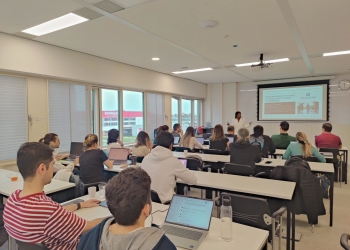
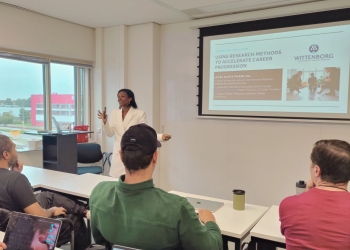
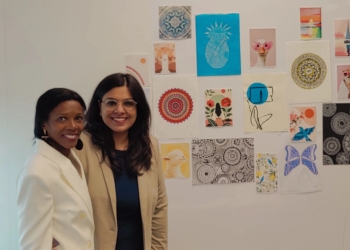
711 words
Wittenborg Takes Major Step Toward New Campus as Partners Sign Letter of Intent
Wittenborg Takes Major Step Toward New Campus as Partners Sign Letter of Intent

Wittenborg Partners With Developers to Build Sustainable Campus in Apeldoorn’s Learning District
Wittenborg University of Applied Sciences has taken a major step forward in the development of its new campus, set to become a central feature of Apeldoorn’s future Learning District in the Veldhuis neighbourhood. A letter of intent has been signed between Wittenborg, BPD | Bouwfonds Gebiedsontwikkeling and Dura Vermeer, marking the beginning of a strong collaboration between the municipality, urban developers and education partners.
The signing took place at Gemeente Apeldoorn and symbolises a shared commitment to transforming the former Nettenfabriek and Royal Talens sites into an inclusive, vibrant and sustainable urban district where living, learning and social connection come together.
The planned campus will include high-quality educational facilities, modern student accommodation and dynamic spaces where students, young professionals and local residents can interact. It aligns with Wittenborg’s strategic vision to expand its Apeldoorn student population from 1,500 to at least 2,500 in the coming years.
CEO Maggie Feng emphasised the significance of the moment, describing the partnership as the result of “years of patience, of networking, of listening, of learning, of determination”.
“Finally, we have become official friends,” Feng said. “This friendship means that we are committed to building a new campus in our Learning District right next to Apeldoorn’s train station, where Wittenborg can grow to at least 2,500 students, continue providing much-needed beds for international students, attract and keep international and national talent and help make Apeldoorn a younger and more diverse city together with all our partners.”
The letter of intent marks the beginning of a detailed development process, with an estimated move-in date around 2030–2031. Current students will not yet be affected by the transition.
The new district is envisioned as a lively, international hub – an area designed for studying, living, working and socialising. The partners aim to create an environment where young people and young-spirited residents feel welcome, where English is spoken freely and where diversity is seen as a natural part of daily life.
“We want this to be a place where everyone wants to be,” Feng added. “A place that is young, fun, international and built on shared values. It’s not about age but mindset.”
Shared Vision for Apeldoorn’s Future
The Learning District forms part of Apeldoorn’s wider ambition to rejuvenate the city, attract more students and young professionals and build a thriving urban community. It also fits within the municipality’s long-term strategy to become a leading Green City by 2040, with emphasis on sustainable urban development, innovation, circular economy principles and the ongoing energy transition.
Apeldoorn’s strategic plan includes goals such as significantly reducing household waste by 2025 and 2030, strengthening the city centre including the Kanaalzone, improving housing availability through both temporary and permanent solutions and fostering green, future-oriented business activity.
WUP 10/12/2025
by Erene Roux
©WUAS Press
Tags
#apeldoorn
#SDG17: Partnerships to achieve the Goal
#SDG11: Sustainable Cities and Communities
#Internationalisation
#Diversity
#societalimpact
501 words

